Develop MCPServer with a focus on eco-friendly technology practices.
Published:
The field of AI Engineering is rapidly evolving and expanding to explore new possibilities. This growth is marked by frequent updates to models, integrations, upgrades, and methodologies, occurring daily and monthly. These advancements are essential for keeping pace with the dynamic nature of AI technologies and their applications.
In the past few year, several key concepts have emerged in artificial intelligence. Agentic AI focuses on autonomous decision-making, while MCP (Model-Context Protocol) enhances model-context interaction. Explainable AI (XAI) prioritizes transparency in AI decisions, and multimodal AI integrates data from various sources. Additionally, there is an increasing emphasis on sustainable AI development, promoting environmentally friendly practices within the industry.
Given the buzz around the MCP Protocol, I want to share my insights as a Green AI practitioner on implementing sustainable AI practices in MCP server implementation. I will outline a few best practices and strategies that can enhance efficiency while minimizing environmental impact. Before procedding futher, lets understand MCP and Green AI.
What is MCP?
An MCP server, or Model Context Protocol server, acts as a bridge between AI models and external resources, enabling them to access and utilize tools, data, and other functionalities in a secure and standardized way. It essentially allows AI models to interact with the real world, going beyond simple text generation to perform actions and access information.
What is Green AI?
Green AI refers to an approach that aims to minimize the environmental impact of artificial intelligence systems across their entire lifecycle. This concept emphasizes the importance of standardizing measurements and metrics, which fosters transparency and builds confidence in AI technologies. By focusing on these aspects, Green AI encourages ongoing improvements in sustainability within the field of artificial intelligence.
To effectively implement Green AI, we need to focus on two key aspects:
- Embracing Green Software coding practices that prioritize sustainability.
- Harnessing the power of eco-friendly Infrastructure, such as green cloud solutions.
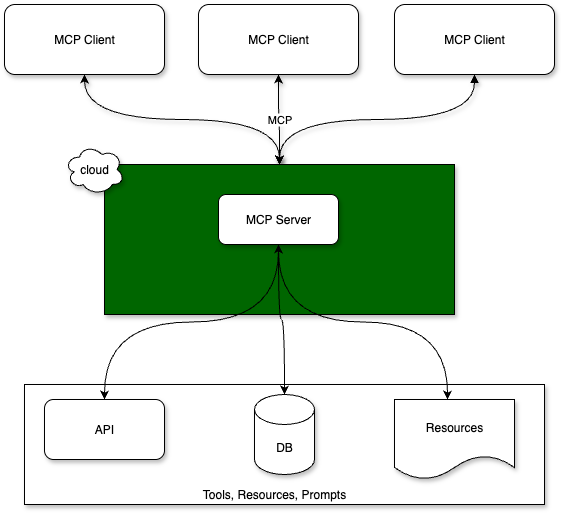
By prioritizing these areas, we can drive innovation while minimizing our environmental impact!
Embracing Green Software coding practices that prioritize sustainability.
MCP Server file before implementing Green AI Coding standards
Here is an example MCP Server file:
from mcp.server.fastmcp import FastMCP
from typing import List
import psutil
import time
import os
import logging
import asyncio
from functools import lru_cache
from pydantic_ai import Agent
from pydantic_ai.models.anthropic import AnthropicModel
from pydantic_ai.providers.anthropic import AnthropicProvider
from dotenv import load_dotenv
# In-memory mock database with 20 leave days to start
student_leaves = {
"S001": {"balance": 18, "history": ["2024-12-25", "2025-01-01"]},
"S002": {"balance": 20, "history": []}
}
# Create MCP server
mcp = FastMCP("LeaveManager", stateless_http=True, host="localhost", port=8000)
# Setup logging for resource monitoring
logging.basicConfig(filename="greenai.log", level=logging.INFO)
load_dotenv()
ANTHROPIC_API_KEY = os.getenv("ANTHROPIC_API_KEY", None)
model = AnthropicModel(
'HuggingFaceH4/mistral-7b-anthropic', provider=AnthropicProvider(api_key=ANTHROPIC_API_KEY)
)
server_agent = Agent(
model
)
# tool
@mcp.tool()
async def poet(theme: str) -> str:
"""Poem generator"""
r = await server_agent.run(f'write a poem about {theme}')
return r.output
# Green AI: async weather fetch with lazy import
@mcp.tool()
async def fetch_weather(city: str) -> str:
"""Fetch current weather for a city (async, lazy import)"""
try:
import httpx
async with httpx.AsyncClient() as client:
response = await client.get(f"https://api.weather.com/{city}")
return response.text
except Exception as e:
import logging
logging.error(f"Weather API error: {e}")
return f"Weather API error: {e}"
# Resource: Leave history
@mcp.tool()
def get_leave_history(student_id: str) -> str:
"""Get leave history for the student"""
data = student_leaves.get(student_id)
if data:
history = ', '.join(data['history']) if data['history'] else "No leaves taken."
return f"Leave history for {student_id}: {history}"
return "Student ID not found."
# Resource: PDF file
@mcp.resource("pdf://Generative_AI")
def get_pdf() -> bytes:
"""Return the contents of the Generative_AI_1705404080.pdf file as bytes."""
pdf_path = os.path.join(os.path.dirname(__file__), "data", "Generative_AI_1705404080.pdf")
with open(pdf_path, "rb") as f:
return f.read()
@mcp.prompt()
def extract_text_from_pdf(resource: str) -> list[str]:
"""Extracts text from a PDF resource."""
# Placeholder: Replace with actual PDF extraction logic
return [f"Extracted text from {resource}: Placeholder text."]
# Resource: Greeting
@mcp.resource("greeting://{name}")
def get_greeting(name: str) -> str:
"""Get a personalized greeting"""
return f"Hello, {name}! How can I assist you with leave management today?"
@mcp.resource("greenai://info")
def greenai_info():
"""Report on green AI practices and resource usage."""
process = psutil.Process(os.getpid())
mem_info = process.memory_info()
cpu_percent = psutil.cpu_percent(interval=0.1)
uptime = time.time() - process.create_time()
return {
"green_ai_practices": [
"Efficient model selection",
"Caching and batching where possible",
"Responsible data handling",
"Resource monitoring"
],
"resource_usage": {
"memory_rss_mb": round(mem_info.rss / (1024 * 1024), 2),
"cpu_percent": cpu_percent,
"uptime_seconds": int(uptime)
}
}
if __name__ == "__main__":
mcp.run(transport="streamable-http")
MCP Server file after implementing Green AI Coding standards
Here are code changes for optimizations to support Green AI in MCP server:
- Adaptive Model Selection Dynamically choose smaller, faster models for non-critical tasks and only use large models when necessary.Uses smaller models for non-critical tasks (e.g., poetry).
- Request Throttling Limit the rate of expensive API calls (e.g., weather) to avoid unnecessary energy and cost.Weather API calls are rate-limited per city to avoid unnecessary requests.
Idle Resource Cleanup Periodically clear caches and close unused resources to free memory. Caching size for PDF is configurable via the PDF_CACHE_SIZE environment variable.
- Batch Processing If multiple requests for weather or PDF extraction are expected, process them in batches.Use fetch_weather_batch to efficiently get weather for multiple cities in one call.
Energy/Carbon Reporting Add a resource that estimates energy or carbon usage based on server metrics. The greenai://energy resource estimates server energy and carbon usage.
Environment-Aware Scheduling Schedule heavy tasks for off-peak hours if possible. The heavy_task tool restricts heavy computations to off-peak hours for energy efficiency.
Periodic cache cleanup: The PDF cache is cleaned up based on a configurable timeout, freeing memory from idle resources.
Async I/O and lazy imports: Reduces blocking and memory usage for weather and PDF resources.
- Logging: Resource usage and errors are logged for monitoring and future optimization.
import torch
import platform
import psutil
import time
import os
import logging
import asyncio
from mcp.server.fastmcp import FastMCP
from typing import List
from dotenv import load_dotenv
from datetime import datetime
from transformers import AutoTokenizer, AutoModel
load_dotenv()
HUGGINGFACE_API_KEY = os.getenv("HUGGINGFACE_API_KEY", None)
model_name = "microsoft/Phi-3-mini-4k-instruct"
tokenizer = AutoTokenizer.from_pretrained(model_name, token=HUGGINGFACE_API_KEY, use_fast=True, trust_remote_code=True)
model = AutoModel.from_pretrained(model_name,
torch_dtype=torch.float16,
low_cpu_mem_usage=True,
use_safetensors=True,
resume_download=True,
force_download=False,
local_files_only=False,
token=HUGGINGFACE_API_KEY,
trust_remote_code=True).eval()
# In-memory mock database with 20 leave days to start
student_leaves = {
"S001": {"balance": 18, "history": ["2024-12-25", "2025-01-01"]},
"S002": {"balance": 20, "history": []}
}
# Create MCP server
mcp = FastMCP("LeaveManager", stateless_http=True, host="0.0.0.0", port=8000)
# Setup logging for resource monitoring
logging.basicConfig(filename="greenai.log", level=logging.INFO)
# Green AI: Adaptive model selection for poetry
@mcp.tool()
async def poet(theme: str) -> str:
def generate_poem():
input_ids = tokenizer.encode(theme, return_tensors="pt")
output = model.generate(
input_ids,
max_new_tokens=50,
num_return_sequences=1,
do_sample=True
)
return tokenizer.decode(output[0], skip_special_tokens=True)
try:
# Run in executor with timeout
loop = asyncio.get_event_loop()
result = await asyncio.wait_for(
loop.run_in_executor(None, generate_poem),
timeout=30 # 30 second timeout
)
return result
except asyncio.TimeoutError:
return "Poem generation timed out. Please try a simpler theme."
# Green AI: async weather fetch with lazy import and request throttling
import time as _time
_last_weather_call = {}
WEATHER_THROTTLE_SECONDS = int(os.getenv("WEATHER_THROTTLE_SECONDS", "10"))
# Green AI: Batch weather processing
@mcp.tool()
async def fetch_weather_batch(cities: List[str]) -> dict:
"""Batch fetch weather for multiple cities (async, lazy import, throttled)"""
import httpx
results = {}
now = _time.time()
async with httpx.AsyncClient() as client:
for city in cities:
last_call = _last_weather_call.get(city)
if last_call and now - last_call < WEATHER_THROTTLE_SECONDS:
results[city] = f"Weather API call for {city} throttled. Try again in {int(WEATHER_THROTTLE_SECONDS - (now - last_call))} seconds."
continue
try:
response = await client.get(f"https://api.weather.com/{city}")
_last_weather_call[city] = _time.time()
results[city] = response.text
except Exception as e:
import logging
logging.error(f"Weather API error: {e}")
results[city] = f"Weather API error: {e}"
return results
# Green AI: Energy/Carbon reporting
@mcp.resource("greenai://energy")
def energy_report():
"""Estimate energy and carbon usage based on server metrics."""
import platform
import psutil
import os
# Simple estimation: energy = uptime * avg_cpu_percent * factor
process = psutil.Process(os.getpid())
uptime = time.time() - process.create_time()
cpu_percent = psutil.cpu_percent(interval=0.1)
# Assume 50W server, 0.5 kg CO2/kWh
energy_kwh = (uptime * cpu_percent / 100 * 50) / 3600000
carbon_kg = energy_kwh * 0.5
return {
"uptime_seconds": int(uptime),
"avg_cpu_percent": cpu_percent,
"estimated_energy_kwh": round(energy_kwh, 4),
"estimated_carbon_kg": round(carbon_kg, 4),
"platform": platform.platform()
}
# Green AI: Environment-aware scheduling (example: restrict heavy tasks to off-peak hours)
def is_off_peak():
import datetime
hour = datetime.datetime.now().hour
# Assume off-peak is 10pm-6am
return hour >= 22 or hour < 6
@mcp.tool()
async def heavy_task(data: str) -> str:
"""Run a heavy task only during off-peak hours."""
if not is_off_peak():
return "Heavy tasks are restricted to off-peak hours (10pm-6am) for energy efficiency."
# ...perform heavy computation...
await asyncio.sleep(2) # Simulate heavy work
return f"Heavy task completed for: {data}"
# Resource: Leave history
@mcp.tool()
def get_leave_history(student_id: str) -> str:
"""Get leave history for the student"""
data = student_leaves.get(student_id)
if data:
history = ', '.join(data['history']) if data['history'] else "No leaves taken."
return f"Leave history for {student_id}: {history}"
return "Student ID not found."
# Green AI: async PDF loading and caching with periodic cleanup
import functools
pdf_cache = {}
PDF_CACHE_SIZE = int(os.getenv("PDF_CACHE_SIZE", "1"))
PDF_CACHE_TIMEOUT = int(os.getenv("PDF_CACHE_TIMEOUT", "600")) # seconds
pdf_cache_times = {}
async def cleanup_pdf_cache():
now = _time.time()
expired = [k for k, t in pdf_cache_times.items() if now - t > PDF_CACHE_TIMEOUT]
for k in expired:
pdf_cache.pop(k, None)
pdf_cache_times.pop(k, None)
@mcp.resource("pdf://Generative_AI")
async def get_pdf() -> bytes:
"""Return the contents of the Generative_AI_1705404080.pdf file as bytes (async, cached, periodic cleanup)."""
await cleanup_pdf_cache()
pdf_path = os.path.join(os.path.dirname(__file__), "data", "Generative_AI_1705404080.pdf")
if pdf_path in pdf_cache:
return pdf_cache[pdf_path]
loop = asyncio.get_event_loop()
with open(pdf_path, "rb") as f:
data = await loop.run_in_executor(None, f.read)
if len(pdf_cache) >= PDF_CACHE_SIZE:
oldest = min(pdf_cache_times, key=pdf_cache_times.get)
pdf_cache.pop(oldest, None)
pdf_cache_times.pop(oldest, None)
pdf_cache[pdf_path] = data
pdf_cache_times[pdf_path] = _time.time()
return data
@mcp.prompt()
def extract_text_from_pdf(resource: str) -> list[str]:
"""Extracts text from a PDF resource."""
# Placeholder: Replace with actual PDF extraction logic
return [f"Extracted text from {resource}: Placeholder text."]
# Resource: Greeting
@mcp.resource("greeting://{name}")
def get_greeting(name: str) -> str:
"""Get a personalized greeting"""
return f"Hello, {name}! How can I assist you with leave management today?"
@mcp.resource("greenai://info")
def greenai_info():
"""Report on green AI practices, resource usage, power consumption, and carbon emissions."""
try:
process = psutil.Process(os.getpid())
mem_info = process.memory_info()
cpu_percent = psutil.cpu_percent(interval=0.1)
uptime = time.time() - process.create_time()
# Power and carbon calculations
power_metrics = calculate_power_consumption(cpu_percent, mem_info)
carbon_metrics = calculate_carbon_emissions(power_metrics, uptime)
# Additional system metrics
disk_usage = psutil.disk_usage('/')
return {
"timestamp": datetime.now().isoformat(),
"green_ai_practices": [
"Efficient model selection (prefer smaller models when possible)",
"Caching and batching to reduce redundant computations",
"Responsible data handling and privacy protection",
"Real-time resource monitoring and optimization",
"Power-aware computing and carbon footprint tracking",
"Using CPU vs GPU based on efficiency requirements",
"Implementing timeouts to prevent resource waste",
"Optimizing for renewable energy usage windows"
],
"resource_usage": {
"memory_rss_mb": round(mem_info.rss / (1024 * 1024), 2),
"memory_vms_mb": round(mem_info.vms / (1024 * 1024), 2),
"cpu_percent": cpu_percent,
"uptime_seconds": int(uptime),
"uptime_readable": f"{int(uptime // 3600)}h {int((uptime % 3600) // 60)}m",
"disk_free_gb": round(disk_usage.free / (1024**3), 2),
"process_threads": process.num_threads()
},
"power_consumption": power_metrics,
"carbon_emissions": carbon_metrics,
"recommendations": generate_green_recommendations(mem_info, cpu_percent, uptime, power_metrics),
"sustainability_score": calculate_sustainability_score(cpu_percent, mem_info, uptime)
}
except Exception as e:
return {
"error": f"Failed to gather resource info: {str(e)}",
"timestamp": datetime.now().isoformat()
}
def calculate_power_consumption(cpu_percent, mem_info):
"""Calculate estimated power consumption based on system usage."""
# Base power consumption estimates (in watts)
# These are approximate values - actual consumption varies by hardware
BASE_CPU_POWER = 15 # Idle CPU power
MAX_CPU_POWER = 65 # Maximum CPU power under full load
RAM_POWER_PER_GB = 3 # Power per GB of RAM
BASE_SYSTEM_POWER = 20 # Motherboard, storage, etc.
# Calculate CPU power based on utilization
cpu_power = BASE_CPU_POWER + (cpu_percent / 100) * (MAX_CPU_POWER - BASE_CPU_POWER)
# Calculate RAM power based on usage
memory_gb = mem_info.rss / (1024**3)
ram_power = memory_gb * RAM_POWER_PER_GB
# Total estimated power
total_power = cpu_power + ram_power + BASE_SYSTEM_POWER
return {
"cpu_power_watts": round(cpu_power, 2),
"ram_power_watts": round(ram_power, 2),
"base_system_watts": BASE_SYSTEM_POWER,
"total_estimated_watts": round(total_power, 2),
"power_efficiency_score": calculate_power_efficiency(cpu_percent, memory_gb)
}
def calculate_carbon_emissions(power_metrics, uptime_seconds):
"""Calculate estimated carbon emissions based on power consumption."""
# Carbon intensity varies by region and energy source
# Global average: ~475g CO2/kWh (varies from ~50g for renewables to ~900g for coal)
CARBON_INTENSITY_GLOBAL = 475 # grams CO2 per kWh
CARBON_INTENSITY_RENEWABLE = 50 # grams CO2 per kWh (wind/solar)
CARBON_INTENSITY_COAL = 900 # grams CO2 per kWh
# Energy consumption in kWh
power_kw = power_metrics["total_estimated_watts"] / 1000
uptime_hours = uptime_seconds / 3600
energy_kwh = power_kw * uptime_hours
# Carbon emissions for different energy sources
carbon_global = energy_kwh * CARBON_INTENSITY_GLOBAL # grams CO2
carbon_renewable = energy_kwh * CARBON_INTENSITY_RENEWABLE
carbon_coal = energy_kwh * CARBON_INTENSITY_COAL
return {
"energy_consumed_kwh": round(energy_kwh, 6),
"carbon_emissions_g": {
"global_average": round(carbon_global, 3),
"renewable_energy": round(carbon_renewable, 3),
"coal_energy": round(carbon_coal, 3)
},
"carbon_emissions_kg": {
"global_average": round(carbon_global / 1000, 6),
"renewable_energy": round(carbon_renewable / 1000, 6),
"coal_energy": round(carbon_coal / 1000, 6)
},
"equivalent_metrics": {
"tree_seconds_offset": round(carbon_global / 21000, 2), # 21kg CO2/year per tree
"km_driven_equivalent": round(carbon_global / 120, 3), # ~120g CO2/km average car
"smartphone_charges": round(energy_kwh / 0.005, 1) # ~5Wh per smartphone charge
}
}
def calculate_power_efficiency(cpu_percent, memory_gb):
"""Calculate power efficiency score (0-100)."""
# Higher score = more efficient (doing more work per watt)
base_efficiency = 100
# Penalize high resource usage without proportional work
if cpu_percent > 80:
base_efficiency -= 30
elif cpu_percent > 50:
base_efficiency -= 15
if memory_gb > 4:
base_efficiency -= 20
elif memory_gb > 2:
base_efficiency -= 10
return max(0, base_efficiency)
def calculate_sustainability_score(cpu_percent, mem_info, uptime):
"""Calculate overall sustainability score (0-100)."""
score = 100
memory_gb = mem_info.rss / (1024**3)
# Penalize resource waste
if cpu_percent > 70:
score -= 25
if memory_gb > 3:
score -= 20
if uptime > 7200: # 2 hours
score -= 15
# Bonus for efficient usage
if cpu_percent < 30 and memory_gb < 1:
score += 10
return max(0, min(100, score))
def generate_green_recommendations(mem_info, cpu_percent, uptime, power_metrics):
"""Generate green AI recommendations based on current usage."""
recommendations = []
memory_gb = mem_info.rss / (1024**3)
power_watts = power_metrics["total_estimated_watts"]
# Memory recommendations
if memory_gb > 3:
recommendations.append("🧠 High memory usage detected - consider model optimization or quantization")
elif memory_gb > 2:
recommendations.append("💡 Consider using memory-efficient models or batch processing")
# CPU recommendations
if cpu_percent > 80:
recommendations.append("⚡ High CPU usage - optimize computations or use GPU acceleration")
elif cpu_percent > 50:
recommendations.append("🔧 Moderate CPU load - monitor for optimization opportunities")
# Power recommendations
if power_watts > 80:
recommendations.append("🌱 High power consumption - consider energy-efficient algorithms")
# Runtime recommendations
if uptime > 3600: # 1 hour
recommendations.append("⏰ Long-running process - implement periodic resource cleanup")
# Carbon recommendations
recommendations.append("🌍 Consider running compute-intensive tasks during low-carbon grid hours")
recommendations.append("♻️ Use renewable energy sources when possible")
# General efficiency
if not any("High" in rec or "Moderate" in rec for rec in recommendations):
recommendations.append("✅ Resource usage looks optimal! Keep up the green practices!")
return recommendations
# Additional utility function for carbon-aware scheduling
def get_carbon_awareness_info():
"""Provide information about carbon-aware computing practices."""
return {
"best_practices": [
"Schedule compute-intensive tasks during low-carbon grid hours",
"Use cloud regions powered by renewable energy",
"Implement demand shifting for non-urgent tasks",
"Monitor and report carbon footprint regularly",
"Choose energy-efficient hardware and algorithms"
],
"low_carbon_hours": "Typically 10 AM - 4 PM when solar power is abundant",
"high_carbon_hours": "Typically 6 PM - 10 PM during peak demand"
}
# Example usage with carbon-aware decision making
def should_run_intensive_task():
"""Simple heuristic to determine if now is a good time for intensive computing."""
current_hour = datetime.now().hour
# Prefer daytime hours (solar power availability)
if 10 <= current_hour <= 16:
return True, "Good time - likely high renewable energy availability"
elif 18 <= current_hour <= 22:
return False, "Peak demand hours - consider postponing if not urgent"
else:
return True, "Acceptable time for moderate compute tasks"
if __name__ == "__main__":
mcp.run(transport="streamable-http")
Harnessing the power of eco-friendly Infrastructure, such as green cloud solutions.
Cloud providers are actively promoting a “Green Cloud” approach, which focuses on using renewable energy to power infrastructure and services while optimizing for lower carbon footprints. These providers not only host systems in data centers that run on renewable resources, but they also offer customers tools and incentives to create more sustainable applications.
As an Azure Cloud practitioner, I will deploy the containerized MCP Server using Azure Container App.
Also, it’s worth noting that Microsoft Azure is committed to sustainability, featuring carbon-neutral data centers, ambitious renewable energy goals, and tools to monitor and reduce carbon emissions.
All Azure VM Instances Are Green:
All Azure virtual machine instances benefit from Microsoft’s carbon-neutral infrastructure and renewable energy commitments. This includes:
- General Purpose VMs (A, B, D series)
- Compute Optimized VMs (F series)
- Memory Optimized VMs (E, M series)
- Storage Optimized VMs (L series)
- GPU VMs (N series)
- High Performance Compute (H series)
- ARM-based Azure Cobalt VMs - Utilize Microsoft’s in-house designed ARM processors with Azure Cobalt VMs
Special Sustainable Regions
Arizona Region: The Arizona region is specifically mentioned as a sustainable datacenter <US West 3>region.
Now that, completed the deployment of MCP Server in US West 3 region and the server is accessible at
Carbon Emission Estimates
- Energy Consumption: Tracks kWh usage over time
- Multiple Carbon Scenarios:
- Global average grid (~475g CO2/kWh)
- Renewable energy (~50g CO2/kWh)
- Coal-powered grid (~900g CO2/kWh)
- Equivalent Metrics:
- Tree-seconds needed to offset emissions
- Equivalent km driven in a car
- Smartphone charges worth of energy
Power Consumption Tracking
- CPU Power: Estimates based on utilization percentage
- RAM Power: Calculates power based on memory usage
- Total System Power: Includes base system components
- Power Efficiency Score: Rates how efficiently power is being used
Green AI Features
- Sustainability Score: Overall environmental impact rating (0-100)
- Carbon-Aware Scheduling: Recommends optimal times for compute tasks
- Smart Recommendations: Context-aware suggestions for reducing environmental impact
Stats and Metrics from Local Machine:
{
"contents": [
{
"uri": "greenai://info",
"mimeType": "text/plain",
"text": "{\n \"timestamp\": \"2025-08-21T22:49:05.994540\",\n \"green_ai_practices\": [\n \"Efficient model selection (prefer smaller models when possible)\",\n \"Caching and batching to reduce redundant computations\",\n \"Responsible data handling and privacy protection\",\n \"Real-time resource monitoring and optimization\",\n \"Power-aware computing and carbon footprint tracking\",\n \"Using CPU vs GPU based on efficiency requirements\",\n \"Implementing timeouts to prevent resource waste\",\n \"Optimizing for renewable energy usage windows\"\n ],\n \"resource_usage\": {\n \"memory_rss_mb\": 173.66,\n \"memory_vms_mb\": 409380.41,\n \"cpu_percent\": 13.3,\n \"uptime_seconds\": 27,\n \"uptime_readable\": \"0h 0m\",\n \"disk_free_gb\": 118.03,\n \"process_threads\": 6\n },\n \"power_consumption\": {\n \"cpu_power_watts\": 21.65,\n \"ram_power_watts\": 0.51,\n \"base_system_watts\": 20,\n \"total_estimated_watts\": 42.16,\n \"power_efficiency_score\": 100\n },\n \"carbon_emissions\": {\n \"energy_consumed_kwh\": 0.000324,\n \"carbon_emissions_g\": {\n \"global_average\": 0.154,\n \"renewable_energy\": 0.016,\n \"coal_energy\": 0.292\n },\n \"carbon_emissions_kg\": {\n \"global_average\": 0.000154,\n \"renewable_energy\": 0.000016,\n \"coal_energy\": 0.000292\n },\n \"equivalent_metrics\": {\n \"tree_seconds_offset\": 0.0,\n \"km_driven_equivalent\": 0.001,\n \"smartphone_charges\": 0.1\n }\n },\n \"recommendations\": [\n \"🌍 Consider running compute-intensive tasks during low-carbon grid hours\",\n \"♻️ Use renewable energy sources when possible\",\n \"✅ Resource usage looks optimal! Keep up the green practices!\"\n ],\n \"sustainability_score\": 100\n}"
}
]
}
Stats and Metrics from Azure APP Services:
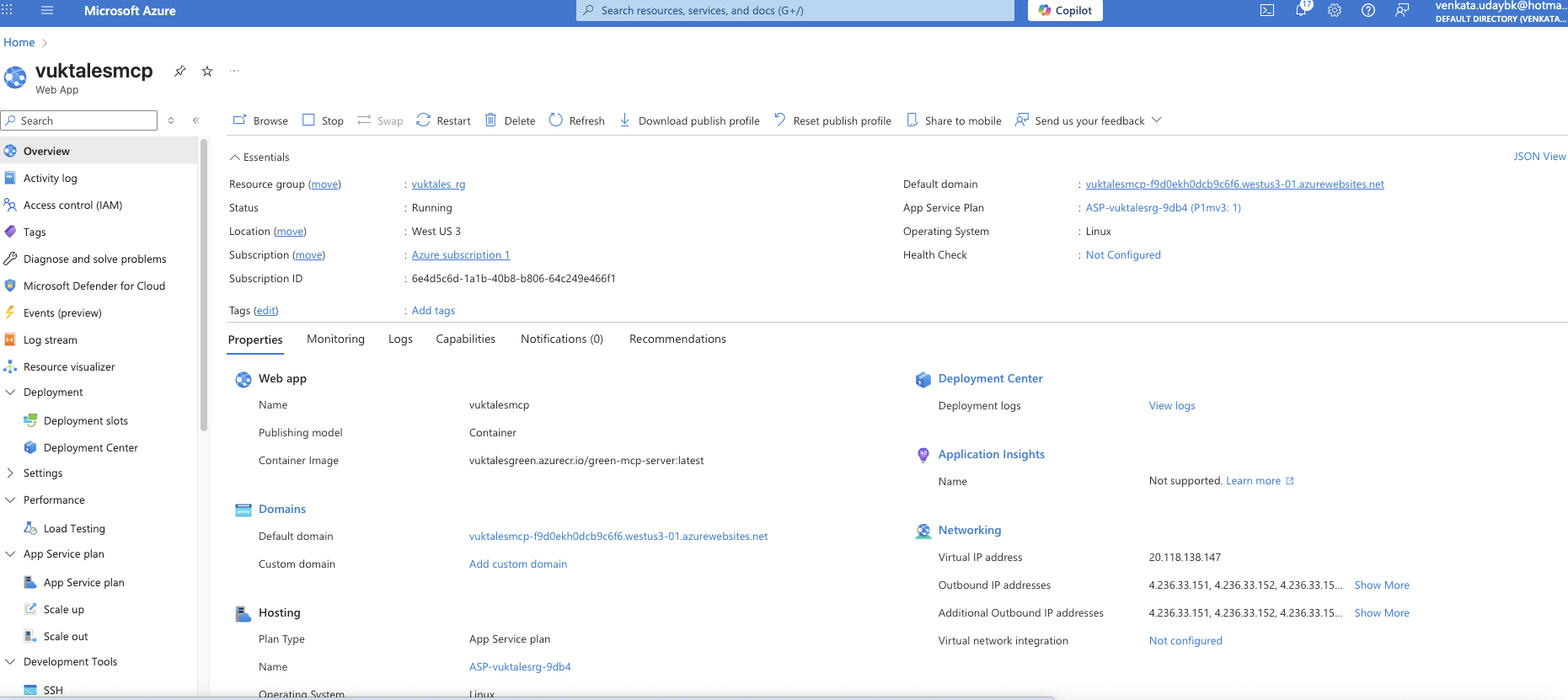
{
"contents": [
{
"uri": "greenai://info",
"mimeType": "text/plain",
"text": "{\n \"timestamp\": \"2025-08-24T03:38:08.340646\",\n \"green_ai_practices\": [\n \"Efficient model selection (prefer smaller models when possible)\",\n \"Caching and batching to reduce redundant computations\",\n \"Responsible data handling and privacy protection\",\n \"Real-time resource monitoring and optimization\",\n \"Power-aware computing and carbon footprint tracking\",\n \"Using CPU vs GPU based on efficiency requirements\",\n \"Implementing timeouts to prevent resource waste\",\n \"Optimizing for renewable energy usage windows\"\n ],\n \"resource_usage\": {\n \"memory_rss_mb\": 7612.32,\n \"memory_vms_mb\": 9029.25,\n \"cpu_percent\": 10.0,\n \"uptime_seconds\": 590,\n \"uptime_readable\": \"0h 9m\",\n \"disk_free_gb\": 28.55,\n \"process_threads\": 10\n },\n \"power_consumption\": {\n \"cpu_power_watts\": 20.0,\n \"ram_power_watts\": 22.3,\n \"base_system_watts\": 20,\n \"total_estimated_watts\": 62.3,\n \"power_efficiency_score\": 80\n },\n \"carbon_emissions\": {\n \"energy_consumed_kwh\": 0.01022,\n \"carbon_emissions_g\": {\n \"global_average\": 4.855,\n \"renewable_energy\": 0.511,\n \"coal_energy\": 9.198\n },\n \"carbon_emissions_kg\": {\n \"global_average\": 0.004855,\n \"renewable_energy\": 0.000511,\n \"coal_energy\": 0.009198\n },\n \"equivalent_metrics\": {\n \"tree_seconds_offset\": 0.0,\n \"km_driven_equivalent\": 0.04,\n \"smartphone_charges\": 2.0\n }\n },\n \"recommendations\": [\n \"🧠 High memory usage detected - consider model optimization or quantization\",\n \"🌍 Consider running compute-intensive tasks during low-carbon grid hours\",\n \"♻️ Use renewable energy sources when possible\"\n ],\n \"sustainability_score\": 80\n}"
}
]
}
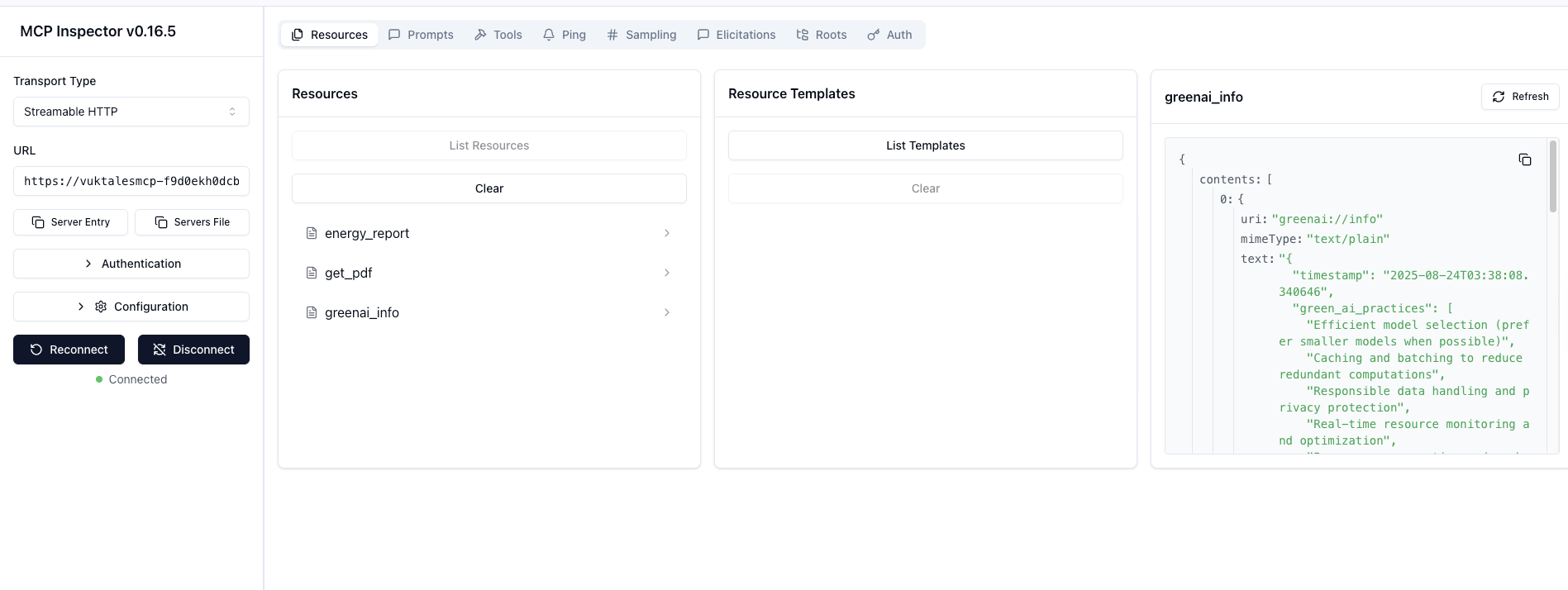
Azure provides a cloud service for viewing and analyzing carbon optimization in emission data. To access it, type “Carbon Optimization” in the search bar.
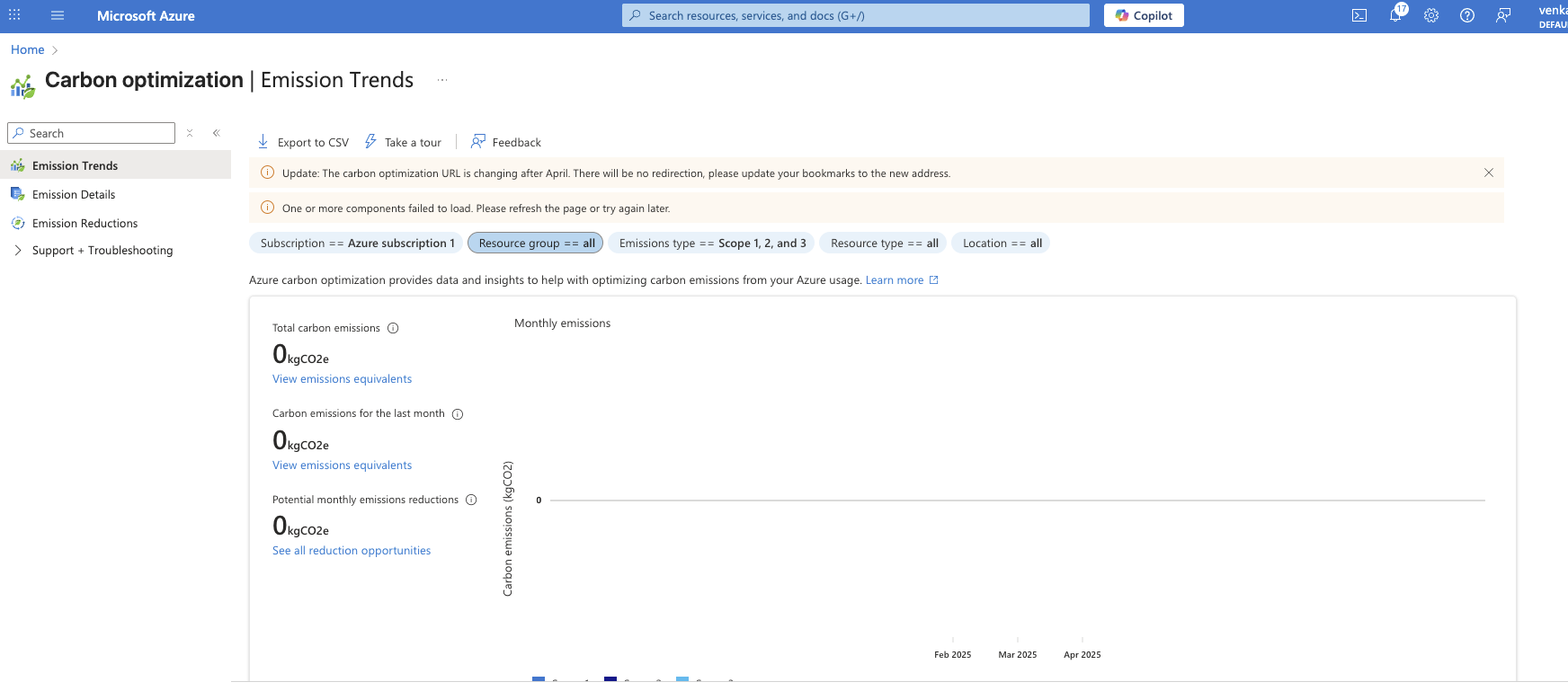
Conclusion:
To integrate Green AI practices into your green-mcp-server.py, focus on energy efficiency and resource optimization with the following key actions:
Efficient Model Usage: Choose smaller models when high accuracy isn’t critical, and consider model quantization or distillation.
Examples of Small Language Models (LLMs): These are lighter than GPT-4/5 but still decent for text generation and reasoning.
- Mistral 7B – strong performance for its size, open source.
LLaMA 2 7B / 13B – Meta’s models, widely used, good balance of size/quality.
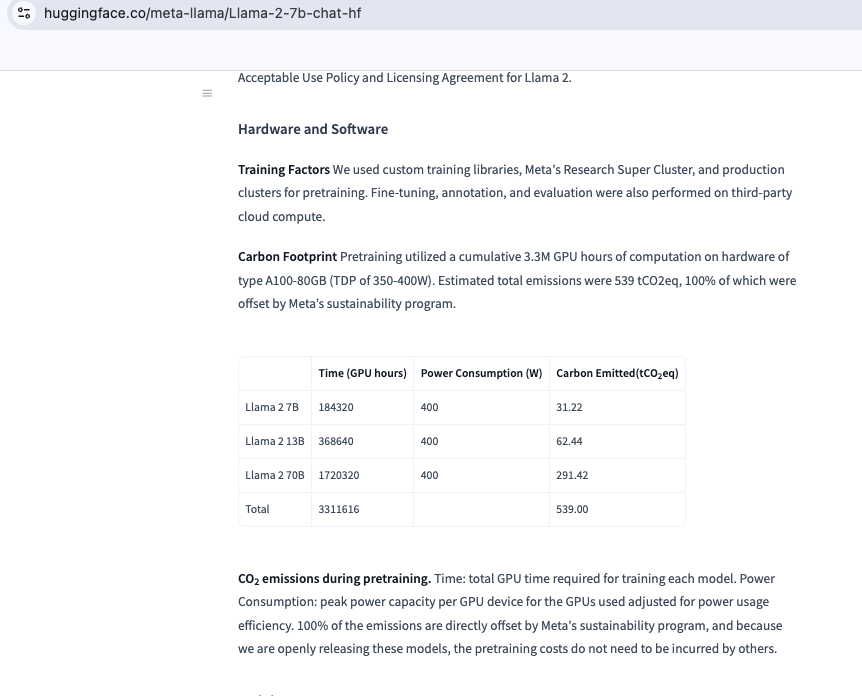
- Gemma (2B, 7B) – Google’s small efficient models.
- Phi-3 (3.8B, 7B, 14B) – Microsoft’s “small but mighty” models optimized for reasoning.
- GPT-4o Mini – lightweight version of GPT-4o, designed for cheaper, faster inference.
Resource Monitoring: Log CPU, memory, and API usage. If possible, track energy consumption.
- Batch Processing: Reduce API calls by batching requests to external services.
import requests user_ids = [1, 2, 3] response = requests.post( "https://api.example.com/users/batch", json={"ids": user_ids} # send multiple IDs in one call ) results = response.json() print(results) # contains all 3 users’ data This way, you reduce 3 calls → 1 call. Caching: Store frequent results (e.g., weather data) to minimize redundant computations.
Responsible Data Handling: Load only necessary parts of large files and limit the retention of large objects in memory.
- Transparency: Set up a
/greenai/infoendpoint to report on energy use and green practices.
While I mentioned the MCP server, implementing these strategies will greatly enhance the sustainability of your AI applications.
Prioritising sustainable practices ensures that your AI initiatives are effective and ethically responsible, contributing to operational excellence and environmental stewardship.
Source is available at : https://github.com/uday160386/Green-MCP